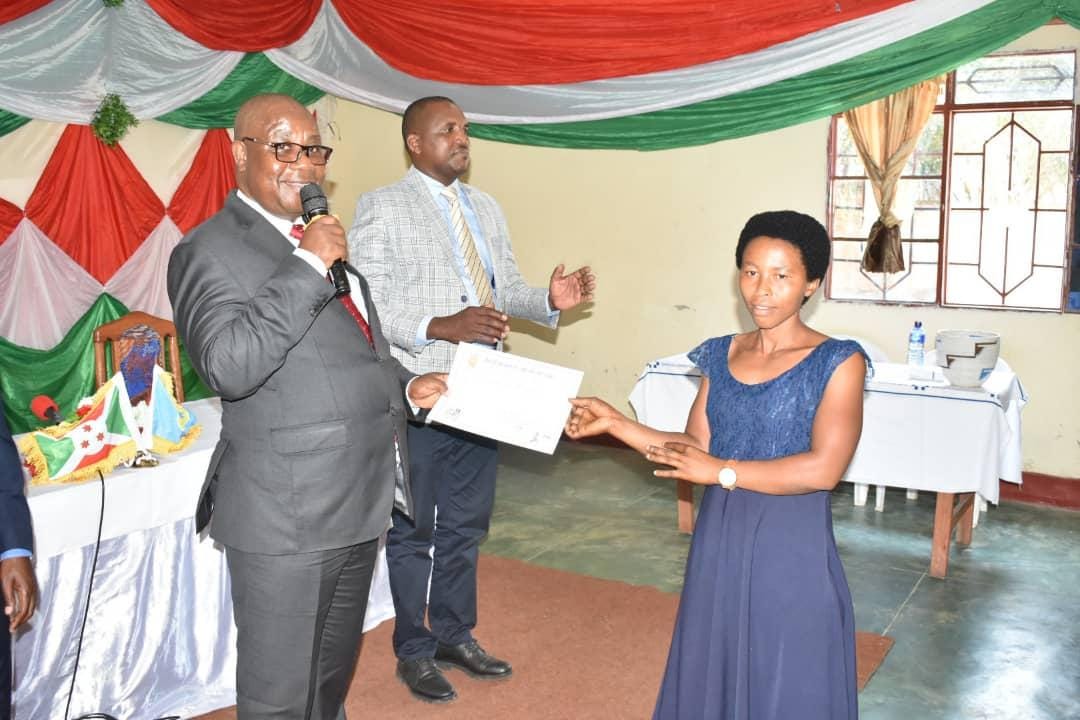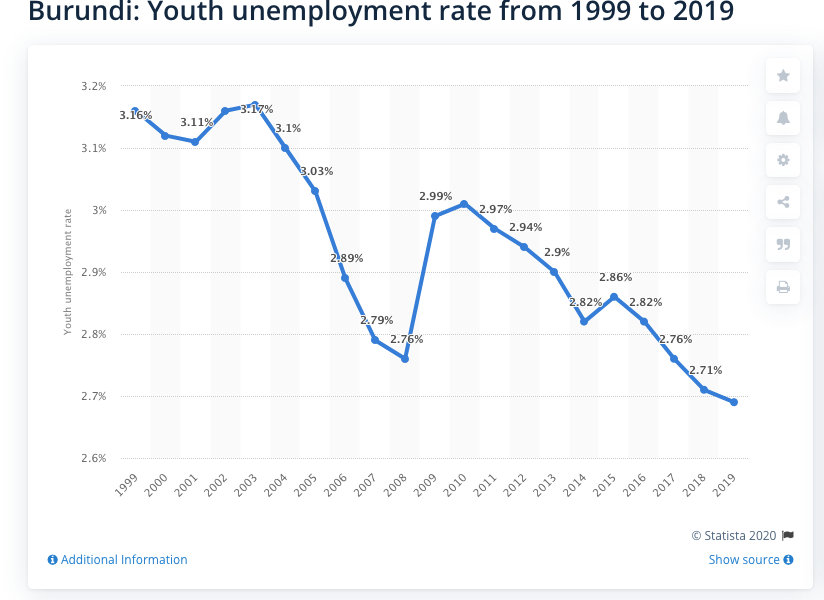Youth Employment in Burundi: Key initiatives and what we should expect
RegionWeek Newsletter Vol III, Issue #125 | Tuesday, September 15, 2020
This is a new version of the RegionWeek Newsletter for the 3rd season( July-December 2020). The content targets Business leaders, Decision-makers, and Young professionals with interests in Burundi and East Africa. Subscribe to stay productive, and competitive in a pandemic and disrupted season.

Dear RegionWeek Reader,
The Burundi Minister of Youth, Amb. Ezéchiel NIBIGIRA, this Monday was in Bubanza province (Western Burundi) where he officiated the ceremonies for awarding certificates to 77 graduates who have followed the first job internship training program executed by the Burundi Agency for Youth Employment “ABEJ” in the French acronym.
In his speech, he emphasized the Youth employment included in Government’s top 6 priorities. Clarifying that the mission is to support and promote youth so that they can reach sustainable development.
In August 2020, during the celebration of the International day of youth, all young people were recommended to form associations and solidarity groups. Amb. Ezéchiel NIBIGIRA indicated that by the end of October an evaluation team will be dispatched throughout the country to ensure the effective establishment of these groups.
He called young people to get ready to benefit from all the advantages and initiatives that Burundi Government has put in place to support their development projects, such as “BIJE Youth Bank”, and the “internship for the 1st job” program.
Youth employment in the news
The Burundian government launched on Saturday, September 12, 2020, a digital census of all graduates but unemployed young Burundians. As of today 5/14/2020 at 5 p.m., an average of 188,011 had already registered across the country. The census follows the implementation of the Economic Empowerment and Youth Employment Program “PAEEJ” in a french acronym announced on July 1st,2020 by President Evariste Ndayishimiye. All the activities related to the PAEEJ program: the setting up of IT tools, the deployment of human resources in the field, the financing of youth cooperative projects, monitoring and evaluation, will be funded by the Government of Burundi.

The statistic shows the youth unemployment rate in Burundi between 1999 and 2019. According to the source, the data are ILO estimates. In 2019, the estimated youth unemployment rate in Burundi was at 2.69 percent
Burundi Youth employment background
All experts and analysts who have documented and commented on youth employment agree that Burundi is embroiled in an employment crisis generated by the poor performance of its economic growth over the past three decades. Lower than 5 percent for the 1980s, negative during the 1990s, it has been accompanied by an increase in poverty which has risen from 35 percent in 1990 to 67 percent today, after having reached a peak of 81.3 percent in 1998.
The small improvement recorded between 2006 and 2009, with an annual growth rate of 4 percent, was not much of a game-changer. For the period 2012-2015, projections assumed an annual growth of 6.9 percent, which was not enough to solve the current problem of youth unemployment, particularly among graduates and young people living in urban areas.
A study carried out in 2016 by the DISCO and REJA consortium shows that youth unemployment in rural areas is 55.2% compared to 65.4% in urban areas. Unemployment remains a real challenge for young Burundians and the whole country.
According to Burundi Statistic Bureau( ISTEEBU), projections show that young people, whose age is between 15 and 29 years old, will constitute the major proportion of those who enter the labor market in the coming years. In Burundi, the youth employment market is characterized by insufficient reliable and up-to-date statistical data and the absence of a real strategy for implementing the National Employment Policy.
The first job seekers, who represent nearly 56%, are more threatened by unemployment than those who are looking for a job but who have already worked in the past (44%). Likewise, long-term unemployment (5 years on average) affects 93% of first applicants and 76% of former workers.
The causes
The causes of youth unemployment in Burundi relate to both supply and demand factors. On the supply side, this is mainly the weakness of growth mainly due to an embryonic private sector that creates little or no jobs; a public service increasingly constrained by structural adjustment policies, strong demographic growth, etc. On the demand side, training is generally not adapted to the needs of the labor market and is often too theoretical, and does not promote entrepreneurship and creativity.
READ ALSO: Burundi sets 2018-2022 as the deadline to solve the youth unemployment problem
Key institutions created to boost youth employment
Burundi Agency for Youth Employment
Established on May 31, 2010, the Burundian Youth Employment Agency (ABEJ) is an institution under the leadership of the Minister of Youth. Since its creation, the ABEJ has received an average of 2,000 requests from young people wanting its support. From 2010 to date, around 250 first-job internships for young graduates have been organized per year.
Burundi Office for Employment and Manpower
Created in 2015 the Burundi Office for Employment and Manpower (OBEM) has the main mission of implementing the National Employment Policy; this office has within it an employment promotion service, a professional development, and retraining service, and an employment and Training Observatory (OEF) which was supposed to consistently gather and publish statistics on employment but unfortunately on this date we were unable to find any publication.
The Youth Investment Bank
The idea of a bank for young people to tackle unemployment among young people was born in 2016, during the National Youth Forum. The Youth Investment Bank (BIJE) was launched on April 15, 2020, in the political capital Gitega by the late President Nkurunziza. The main objective of BIJE is to reduce youth unemployment by helping them to have and create jobs. And its mission is to contribute to the financing of economic development projects initiated by young people organized in associations, cooperatives, or companies governed by Burundian law.
The bottom line: what should we expect in the coming days?
With all structures, initiatives that are being put in place, analysts believe that problems of governance in the management of employment opportunities are still a serious challenge. Even though the inaccessibility to the formal financing system seems to have found a solution within the Youth Investment Bank ambitions, experts note that insufficient support structures for self-employment and poor market diversification may hinder the optimal results.
Will all structures and initiatives be able to mobilize substantial investments in order to modernize the agricultural sector and develop growth-promoting sectors such as tourism, crafts, mining, and ICT? Will the major part of unemployed young people get jobs? It would be had to expect such a thing in an actual setting, leaders and their partners should capitalize on steps already made, structures have been created needs to innovate through capacity building and effective resource channeling.
Much attention must be paid to the participation of the private sector as an engine of development. The promotion of an attractive business climate and the establishment of infrastructures that support production may be the core pillars to boost Youth employment projects underway.
Thanks for reading
Fabrice Iranzi, RegionWeek.com
Support RegionWeek Newsletter!
Contribute at least $5/Month, and join our amazing community of supporters!
RegionWeek is a Burundi-based media for a new generation of achievers in Africa, a platform devoted to chronicling the journey to Freedom and Empowerment.



